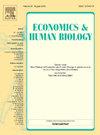收入增加睡眠时间减少:世界各地睡眠不平等的宏观和微观证据
IF 1.8
3区 医学
Q2 ECONOMICS
引用次数: 0
摘要
人一生中大约有三分之一的时间在睡觉。我们的论文利用详细的时间使用数据来研究收入导致的睡眠不平等。我们的贡献在于使用全球样本分析了国家内部和国家之间的这种关系。在微观层面上,我们发现收入最高的四分之一的全职男性员工每天的睡眠时间比收入最低的四分之一的全职男性员工少半小时左右。这一定性结果对各种替代测试和关键变量的测量是稳健的。在宏观层面上,平均睡眠时间随着国家人均GDP的增加而减少。有趣的是,我们的微观和宏观估计都与睡眠的收入弹性估计在- 0.04左右是一致的。利用这种弹性,我们复制了在以前的单一国家研究中确定的隐含关系。其他研究结果表明,其他休闲活动可能与收入呈正相关,如上网和社交活动,取代睡眠。本文章由计算机程序翻译,如有差异,请以英文原文为准。
Sleep hours fall as income rises: Macro and micro evidence on sleep inequality around the world
People spend about a third of their lives sleeping. Our paper utilizes detailed time-use data to study sleep inequality by income. Our contribution lies in analyzing this relationship both within and across countries, using a global sample. At the micro level, we find that full-time male workers in the top income quartile sleep around half an hour less per day than those in the lowest quartile. This qualitative result is robust to various alternative tests and measurement of key variables. At the macro level, the average sleep hours decrease as the country’s GDP per capita increases. Interestingly, both our micro and macro estimations, are coherent with an estimated income elasticity of sleep around . Using this elasticity we replicate the implicit relationships identified in previous single-country studies. Additional results suggest that other leisure activities may be positively correlated to income, such as internet use and social outings, substituting sleep.
求助全文
通过发布文献求助,成功后即可免费获取论文全文。
去求助
来源期刊

Economics & Human Biology
医学-公共卫生、环境卫生与职业卫生
CiteScore
4.50
自引率
12.00%
发文量
85
审稿时长
61 days
期刊介绍:
Economics and Human Biology is devoted to the exploration of the effect of socio-economic processes on human beings as biological organisms. Research covered in this (quarterly) interdisciplinary journal is not bound by temporal or geographic limitations.
 求助内容:
求助内容: 应助结果提醒方式:
应助结果提醒方式:


